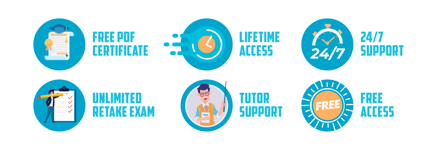Level 5 Accounting & Finance
Spring Sale | Proper Guideline + PDF Certificates | Instant Access | 24/7 Live Support | Lifetime Access
Training Tale
Summary
- Certificate of completion - Free
- Exam(s) / assessment(s) is included in price
- Tutor is available to students
Add to basket or enquire
Overview
***Level 5 Accounting & Finance***
Accounting and finance assist businesses in measuring, monitoring, and planning their operations. This Level 5 Accounting & Finance course has been designed to provide a thorough introduction to business Accounting and Finance as both an idea and a profession.
This course will equip you with in-demand accounting and finance skills as well as the ability to complete practicable processes while working in an organisation. This could be tricky, especially if this is your first consignment in the accounting and finance sector. Our Level 5 Accounting & Finance course provides a solid understanding of accounting and financial methods, concepts, and duties to properly prepare you for a career in the accounting and finance sector.
Learning Outcomes
After completing this Level 5 Accounting & Finance course, learner will be able to:
- Understand the essentials of accounting and finance
- Understand the types of cost data and cost analysis
- Gain a thorough understanding of contribution analysis
- Understand break-even and cost-volume-profit analysis
- Understand relevant cost and know to make short-term decisions
- Know how to manage financial assets
- Understand forecasting cash needs and budgeting
- Cost control and variance analysis
- Know how to manage accounts receivable and credit
- Know how to manage inventory
- Understand the time value of money
- Know how to improve managerial performance
- Understand capital budgeting decisions
- Understand improve managerial performance
- Understand sources of short-term financing
- Know how to consider term loans and leasing
- Understand long-term debt and equity financing
- Understand accounting conventions and recording financial data
Why Choose Level 5 Accounting & Finance Course from Us
- Self-paced course, access available from anywhere.
- Easy to understand, high-quality study materials.
- Course developed by industry experts.
- MCQ quiz after each module to assess your learning.
- Automated and instant assessment results.
- 24/7 support via live chat, phone call or email.
- Free PDF certificate as soon as completing the course.
***Others Benefits of this Level 5 Accounting & Finance Course
- Free One PDF Certificate
- Lifetime Access
- Unlimited Retake Exam
- Tutor Support
[ Note: Free PDF certificate as soon as completing the course ]
Course media
Description
***Level 5 Accounting & Finance***
Detailed Course Curriculum of this Level 5 Accounting & Finance Course:
Module 1: Essentials of Accounting and Finance
- Identify the Non-Financial Manager’s Concern with Finance
- The Importance of Finance
- Financial and Operating Environment
Module 2: Types of Cost Data and Cost Analysis
- The Importance of Cost Data
- Types of Costs
- How Do Your Costs Behave?
- Segregating Fixed Cost and Variable Cost
- Cost Allocation
- Cost Analysis
- What You Can Learn from the Japanese?
Module 3: Contribution Analysis
- Should You Accept a Special Order?
- How Do You Determine a Bid Price?
- Determining Profit from Year to Year
- Are You Utilising Capacity?
Module 4: Break-Even and Cost-Volume-Profit Analysis
- What is Cost-Volume-Profit Analysis?
- What and Why of Break-Even Sales?
- What is the Margin of Safety?
- Cash Break-Even Point
- What is Operating Leverage?
- Sales Mix Analysis
Module 5: Relevant Cost and Making Short-Term Decisions
- What Costs Are Relevant to You?
- Accepting or Rejecting a Special Order
- Pricing Standard Products
- Determining Whether to Sell or Process Further
- Adding or Dropping a Product Line
- Utilising Scarce Resources
- Don’t Forget the Qualitative Factors
Module 6: Forecasting Cash Needs and Budgeting
- Forecasts
- Using Forecasts
- Preparing Financial Forecasts
- Budgets
- The Sales Budget
- The Production Budget
- The Direct Material Budget
- The Direct Labour Budget
- The Factory Overhead Budget
- The Ending Inventory
- The Selling and Administrative Expense Budget
- The Cash Budget
- The Budgeted Income Statement
- The Budgeted Balance Sheet
- A Shortcut Approach to Formulating the Budget
Module 7: Cost Control and Variance Analysis
- Defining a Standard
- The Usefulness of Variance Analysis
- Setting Standards
- Determining and Evaluating Sales Variances
- Cost Variances
- Labour Variances
- Overhead Variances
- The Use of Flexible Budgets in Performance Reports
- Standards and Variances in Marketing
- Sales Standards
- Variances in Warehousing Costs
Module 8: Managing Financial Assets
- Working Capital
- Financing Assets
- Managing Cash Properly
- Getting Money Faster
- Delaying Cash Payments
- Opportunity Cost of Foregoing a Cash Discount
- Volume Discounts
Module 9: Managing Accounts Receivable and Credit
- Credit References
- Credit Policy
- Analysing Accounts Receivable
Module 10: Managing Inventory
- Inventory Management Considerations
- Inventory Analysis
- Determining the Carrying and Ordering Costs
- The Economic Order Quantity (EOQ)
- Avoiding Stock Outs
- Determining the Reorder Point or Economic Order Point (EOP)
- The ABC Inventory Control Method
- Supply Chain Management
Module 11: The Time Value of Money
- Future Values – How Money Grows
- Future Value of an Annuity
- Present Value – How Much Money is Worth Now?
- Present Value of Mixed Streams of Cash Flows
- Present Value of an Annuity
- Perpetuities
- Applications of Future Values and Present Values
Module 12: Capital Budgeting Decisions
- Types of Investment Projects
- What Are the Features of Investment Projects?
- Selecting the Best Mix of Projects With a Limited Budget
- Income Taxes and Investment Decisions
- Types of Depreciation Methods
- How Does MACRS Affect Investment Decisions?
- The Cost of Capital
Module 13: Improving Managerial Performance
- What is Return on Investment (ROI)?
- What Does ROI Consist of? - Du Pont Formula
- ROI and Profit Objective
- ROI and Profit Planning
- ROI and Return on Equity (ROE)
Module 14: Sources of Short-Term Financing
- Trade Credit
- Cash Discount
- When are Bank Loans Advisable?
- Working with a Bank
- Issuing Commercial Paper
- Using Receivables for Financing
- Using Inventories for Financing
Module 15: Considering Term Loans and Leasing
- Intermediate-Term Bank Loans
- Using Revolving Credit
- Insurance Company Term Loans
- Financing with Equipment
- Leasing
Module 16: Long-Term Debt and Equity Financing
- Types of Long-Term Debt
- Equity Securities
- How Should You Finance?
Module 17: Accounting Conventions and Recording Financial Data
- Double Entry and the Accounting Equation
Assessment Method
After completing each module of the Level 5 Accounting & Finance course, you will find automated MCQ quizzes. To unlock the next module, you need to complete the quiz task and get at least 60% marks. Once you complete all the modules in this manner, you will be qualified to request your certification.
Certification
After completing the MCQ/Assignment assessment for this Level 5 Accounting & Finance course, you will be entitled to a Certificate of Completion from Training Tale. It will act as proof of your extensive professional development. The certificate is in PDF format, which is completely free to download. A printed version is also available upon request. It will also be sent to you through a courier for £13.99.
Who is this course for?
Level 5 Accounting & Finance
This Level 5 Accounting & Finance course is ideal for:
- Candidates interested to start a career in accountancy
- Business owners seeking to look after their own accounts
- Existing accountancy workers in seeking higher positions or promotion
- Accountancy workers with no formal qualifications
- Anyone wishing to boost their career prospects.
Requirements
Level 5 Accounting & Finance
There are no specific requirements for Level 5 Accounting & Finance course because it does not require any advanced knowledge or skills.
Students who intend to enrol in this Level 5 Accounting & Finance course must meet the following requirements:
- Good command of the English language
- Must be vivacious and self-driven
- Basic computer knowledge
- A minimum of 16 years of age is required
Career path
Level 5 Accounting & Finance
This Level 5 Accounting & Finance course may lead you to a variety of career opportunities.
- Accounts Assistant
- Accounts Payable & Expenses Supervisor
- Accounts Payable Clerk
- Audit Trainee
- Payroll Administrator / Supervisor
- Tax Assistant / Accountant.
- Accounting Clerk
- Auditing Clerk
- Accounts Receivable Clerk
Questions and answers
Currently there are no Q&As for this course. Be the first to ask a question.
Certificates
Certificate of completion
Digital certificate - Included
Reviews
Currently there are no reviews for this course. Be the first to leave a review.
Legal information
This course is advertised on reed.co.uk by the Course Provider, whose terms and conditions apply. Purchases are made directly from the Course Provider, and as such, content and materials are supplied by the Course Provider directly. Reed is acting as agent and not reseller in relation to this course. Reed's only responsibility is to facilitate your payment for the course. It is your responsibility to review and agree to the Course Provider's terms and conditions and satisfy yourself as to the suitability of the course you intend to purchase. Reed will not have any responsibility for the content of the course and/or associated materials.





